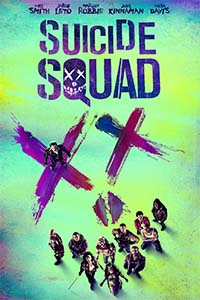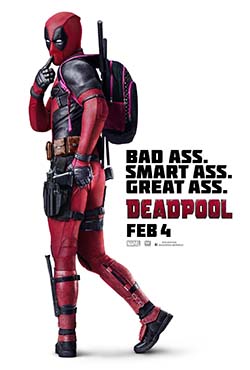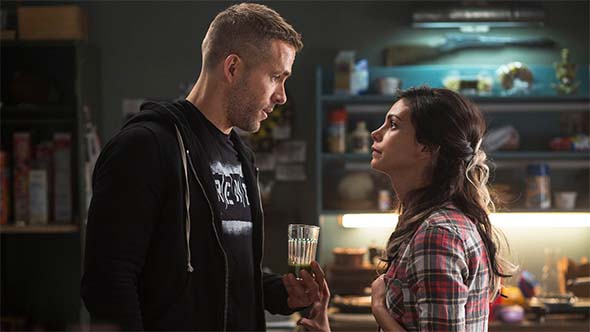Another summer, another onslaught of comic book movies. This year, we're spared the misery of another of Warner's DC Comic movies, so we get two Marvel movies (including the recently-released Infinity War and the soon-to-be-released Ant Man and the Wasp), and we get a sequel to Fox's Deadpool. The first Deadpool was pretty great, even though it wasn't as groundbreaking as it seemed to think it was. Nevertheless, it was thoroughly entertaining, and the sequel follows suit.
I do think that the first movie's humor is executed much better though, as the sequel frequently fell flat for me. That isn't for lack of trying though. Deadpool 2 almost tries too hard. The jokes come fast and relentless. A lot of them fall flat, but the volume of attempts is so high that the audience the audience is chuckling or laughing every couple minutes. It's almost a "Barney Stinson" approach to joke-telling: if you tell enough, at least some of them will work. Then again, it might also be different jokes for different people.
I rarely ever found myself laughing out loud during this movie. I laughed out loud to a few jokes in the first movie, but hardly anything in this one. It was a lot more quietly chuckling to myself or nodding along that "Ah, I get it". At least there weren't quite as many contemporary pop culture references this time around (which means this movie will probably age better than the first one will), as more of the jokes were at the expense of comic book movies and comic books in general. Since I didn't read X-Men too extensively, a lot of it probably just went over my head.
I only found myself laughing at a small fraction of the jokes, including the extended X-Force gag.
Again, Deadpool takes a lot of shots at the studio, complaining once again about the lower budget of the movie and the lack of any recognizable X-Men. He asks if Cable is from the DC Universe because Cable is so dark and brooding, and he takes several other shots at Batman v Superman and Justice League. He also takes a couple shots at Marvel Studios, including referring to Cable as Thanos.
Is the crappy quality of the CGI villain intentional? Is that supposed to be a joke? If so, does that justify the dated CG that was used?
Cable and Deadpool play off each other really well.
It's hard to tell if other signs of uninspired writing are deliberate jokes, or just examples of uninspired writing, especially since Deadpool quips once or twice about the movie's lazy writing. For example, does it really make sense that Deadpool and Cable are trying to stop Firefist from going on a killing spree, even though Deadpool and Cable kill literally everyone in their path to do so? Wouldn't that just reinforce in Firefist's mind that killing is acceptable? [More]
1d222fa4-8ba2-4dee-8919-c8dd6300d008|0|.0
Tags:Deadpool, X-Men, 20th Century Fox, Ryan Reynolds, Josh Brolin, Zazie Beetz, Morena Baccarin, Cable, Colossus, Negasonic Teenage Warhead, Domino, Firefist, Juggernaut, X-Force, R-rating, violence, mutant, Marvel, Marvel Comics, comic book, Wolverine, Logan, time travel, fourth wall

Suicide Squad
I wasn't sure what to think when I walked out of Suicide Squad this past weekend. I desperately wanted this to be the movie in which DC finally gets its ducks in a row and makes a fully competent movie (instead of just half a competent movie). I wanted to find things to like about the movie. I wanted to see some brilliant artistic vision that was realized in the film. But I just couldn't. The whole movie was just off-putting.
I feel like the original creative vision revolved around showing a sense of nobility and honor among villains, while also highlighting that supposed "good guys" can actually be very evil. You know, real Watchmen-level kind of stuff. This would have mirrored some of the more enjoyable elements in the first half of Dawn of Justice (in which Superman and Batman's actions are viewed from different perspectives) and would have offered a pretty solid artistic message. This possible original intent is most apparent with Deadshot and Amanda Waller (Viola Davis), whose behavior is inverse of their perception within society. Deadshot is a vigilante and murderer who is locked up in prison, but he is the most noble and compassionate character in the film. Waller, on the other hand, is a national security adviser responsible for protecting the lives of hundreds of millions of people, but she is a merciless, cynical bitch who will shoot her entire staff in the heads because they apparently didn't have clearance to participate in ... the operation that she enlisted them into?
It's all so ham-fisted. Despite being the most likable, relatable, and heroic character in the movie, Deadshot's sense of honor just gets obnoxious. Waller, on the other hand, is obnoxiously vile. The result is that neither character really works for me, and that underlying theme about "who are the real bad guys?" just kind of gets lost in the meaninglessness of the individual characters' actions.
Deadshot and Amanda Waller seem to be ham-fisted attempts at subverting the "bad guys" and "good guys" tropes.
The fact that none of the other characters besides Harley and El Diablo (who ended up being my favorite character in the film) get any development at all certainly doesn't help. A two-hour runtime is pretty standard for a movie, but I simultaneously feel as though half the movie is cut out, and that half of what is present drags on... [More]
2e8ba24d-94e5-4bc7-b27b-ac1bf895baad|2|5.0
Tags:Suicide Squad, DC Comics, comic book, Warner Brothers, Harley Quinn, Deadshot, Killer Croc, Captain Boomerang, El Diablo, Katana, Enchantress, Amanda Waller, Batman, Joker, Stockholm Syndrome, Superman, Batman Versus Superman: Dawn of Justice, Margot Robbie, Jared Leto, Will Smith, Viola Davis, Ben Affleck, Deadpool

Deadpool tries to make a big deal about how this is "a different kind of super hero movie". He backs this up by pointing out how he just turned a bad guy into a bloody kabob, and by dropping F-bombs and explicit sex jokes every other line of dialogue. True it isn't exactly the typical super hero movie, but it wasn't anything that we haven't already seen in the larger field of comic book movies. Adaptations of graphic novels like Watchmen, Kickass, Sin City, and 300 are loaded with plenty of gratuitous, graphic violence, foul language, sex, and even some impressive glowing blue penises. Heck, even within the subset of Marvel superhero movies, there's already the R-rated Blade.
So I thought it was a bit pretentious for Deadpool to make his movie out to be "unique" for its hard-R rating. It isn't. And it certainly isn't that unique in its plot, which is a pretty standard, cliched origin story with love interest female lead, complete with the hero trying to rescue his kidnapped girlfriend from an arrogant villain. Nothing new there. It is a little bit more unique in its sense of humor though. If you didn't already know, Deadpool is pretty infamous for being a fourth-wall-breaking meta character. In his appearances in comic books, he routinely jokes or comments about being in a comic book, and his appearances in video games also usually include references to comic books or to video games.
So this movie is trying to sell itself on its wit, and it both succeeds brilliantly, and fails miserably. The opening credit sequence and other digs at the studio system (including a dig at the studio being too cheap to afford any other X-Men cameos) work very well. Other pop culture references fall a bit flat and will only serve to date the movie in the future. I was also very disappointed that Deadpool didn't comment on the absurdly cliche plot twist of the villain kidnapping the hero's girlfriend. That's like a violation of cardinal rule #1 for movie supervillians: don't kidnap the hero's girlfriend. Unless her name is Gwen Stacy, then I guess you've got a case for the kidnapping.
Ryan Reynolds pulls the character off with pitch perfect execution, and his performance isn't hurt at all by the occasional poor joke. He inhabits the role with the same dedication as Robert Downy Jr. in Iron Man, and Reynolds and Deadpool will likely be inseparable from each other for the future.

Despite the cliche plot, Morena Baccarin's character is surprisingly relevant to the protagonist's development.
The villain is pretty lame though, with paper-thin motivation that really does prevent the cliche plot from really transcending the banality of the genre. And really, that's probably the greatest weakness of the movie. Despite taking [what the studio apparently perceives as] risks with the R-rating and over-the-top violence and sex, the actual plot is so "safe" and cheesy. It probably would have worked a bit better for me if it had stuck to being a revenge movie, but once it became apparent that the bad guy was going to kidnap the girlfriend, I kind of sighed and sunk back into my chair, "Oh, another one of these."
At least the romance is much more integral to the movie's plot than in other super hero movies in which the love interest feels tacked on and just there... [More]
c31ecfb9-14cb-4234-96ec-7542f0c8446b|1|5.0
Tags:Deadpool, X-Men, 20th Century Fox, Ryan Reynolds, Ed Skrein, Morena Baccarin, Ajax, Colossus, Negasonic Teenage Warhead, R-rating, nudity, violence, sex, romantic comedy, mutant, Marvel, Marvel Comics, comic book, fourth wall
|

| 12 | | | | | | | 60 | | 11 | | | | | | | 55 | | 10 | | | | | | | 50 | | 09 | | | | | | | 45 | | 08 | | | | | | | 40 | | 07 | | | | | | | 35 | | 06 | | | | | | | 30 | | 05 | | | | | | | 25 | | 04 | | | | | | | 20 | | 03 | | | | | | | 15 | | 02 | | | | | | | 10 | | 01 | | | | | | | 05 |
|